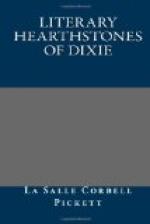But if ever, forgetful of her past and present glory, she shall cease to be “the land of the free and the home of the brave,” and become the purchased possession of a company of stock-jobbers and speculators; if her people are to become the vassals of a great moneyed corporation, and to bow down to her pensioned and privileged nobility; if the patriots who shall dare to arraign her corruptions and denounce her usurpations are to be sacrificed upon her gilded altar,—such a country may furnish venal orators and presses, but the soul of national poetry will be gone. That muse will “never bow the knee in mammon’s fane.” No, the patriots of such a land must hide their shame in her deepest forests, and her bards must hang their harps upon the willows. Such a people, thus corrupted and degraded,
“Living,
shall forfeit fair renown,
And, doubly dying,
shall go down
To the vile dust
from whence they sprung,
Unwept, unhonored,
and unsung.”
“THE POET-PRIEST”
FATHER RYAN
My first meeting with Father Ryan was at the Atlantic Hotel in Norfolk, in which town he had spent the first seven years of his life, his parents having emigrated from Limerick and found a home there a short time before his birth. He has been claimed by a number of cities, and the dates of his nativity, as assigned by biographers, range from 1834 to 1840, 1839 being the one best established. He told me that his early memories of his Norfolk home were especially associated with figs and oysters, the oysters there being the largest and finest he had ever seen, they and the figs seeming to “rhyme with his appetite.” Then he told me an oyster story:
“A negro boatman was rowing some people down the river, among them two prominent politicians who were discussing an absent one. ’He has no more backbone than an oyster,’ said one. The boatman laughed, and said, ‘Skuse me, marsers, but if you-all gemmen don’ know no mo’ ’bout politicians dan you does ‘bout oyschers you don’ know much. No mo’ backbone dan a oyscher! Why, oyschers has as much backbone as folks has, en ef you cuts into ’em lengfwise a little way ter one side en looks at ’em close you’ll see dar backbone’s jes’ lak we all’s backbone is. De only diffunce is de oyscher’s backbone is ter one side, jes’ whar it ought ter be, ’stead er in de middle. Dat’s de reason I t’ink de debbil mus’ er tuck a han’ en he’ped ter mek we alls, en you know de Lord says, Let us mek man; dat shows dat He didn’ do hit all by Hese’f; ef He had He’d a meked we all’s backbone ter de side whar de oyscher’s is, ter pertect us, en put our shin bones behime our legs, whar dey wouldn’t all de time git skint, en put our calfs in de front.’”




